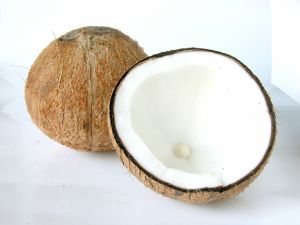 When the immune system of the body reacts adversely towards coconut or the foods containing coconut, this condition is called coconut allergy. This allergy is quite rare, and its serious reactions are hardly found in people. Though contact allergic dermatitis is commonly found, there are some reported sensitization cases to coconut pollen.
When the immune system of the body reacts adversely towards coconut or the foods containing coconut, this condition is called coconut allergy. This allergy is quite rare, and its serious reactions are hardly found in people. Though contact allergic dermatitis is commonly found, there are some reported sensitization cases to coconut pollen.
Coconut is one of the most helpful fruit throughout the world. It is a native of tropical areas, and it is of great economic value to the man as inner white flesh can be eaten, and its water is used as a health drink. The outer husk is used to make mats and ropes. The derivatives of coconut are used in preparing various delicacies throughout the world. It is also used in preparing several cosmetic products like creams, soaps, and shampoos.
Sometimes, cross allergic reactions can be found in people who are allergic to similar proteins present in plants’ nuts like peanuts. Contact dermatitis allergy is commonly found in some people due to coconut as ingredients in various cosmetics and infant foods. People who are allergic to latex can also show sensitivity towards coconut. According to FDA, foods containing coconut must include a label stating nuts as ingredients.
Coconut Allergy Symptoms and Treatment
Symptoms of Coconut Allergy
Two main food groups causing allergies are dairy and nuts. Though, coconut have never been thought as a food to be causing allergies, but today, many people are experiencing sensitivity towards this nut. Some coconut allergy symptoms include the following:
- Eyes symptoms: Itchy, watery and sore eyes
- Skin problems: hives, facial redness, blisteres and skin flushing
- Diarrhea
- Vomiting
- Respiratory problems
- Runny nose
- Constipation
- Swelling in throat
- Sinus pain or headache
- Tingling sensation in oral cavity
- Low blood pressure
- Asthma
- Coughing
- Sleeping disturbance
- Swollen glands
- Nausea
- Hoarse voice
- Difficulty in swallowing
- Light headedness
The body reacts to specific proteins if you have a food allergy or a contact allergy through some proteins. The body’s immune system responds by releasing an antibody called immunoglobulin E (IgE) in the blood. Proteins present in food or other substance triggers the reaction.
Nut Allergy Occurence
It is found that allergy towards peanuts or other nuts is found in only one infant out of 100 and in only one adult out of 200. Hence, compared to this data, coconut allergy is quite rare.
It is also found that people who are allergic to coconut foods generally have a severe vitamin B deficiency. So, if this deficiency is resolved, the allergy to coconut is also taken care of.
Diagnosis of Coconut Allergy
Since a tree nut allergy can cause life-threatening reactions, a reliable diagnosis is required:
- Medical History: The doctor will go through the medical history to know about allergic reactions in the past and also in allergic reactions running in the family.
- Blood tests: Blood tests or skin prick tests will be done to determine the presence of antibody IgE.
- Oral food challenge: If the above tests do not furnish any results, then he may ask you to go for an oral food challenge. The allergic person will be given small amounts of the suspected allergen, and then the doses will be increased for a certain time. This test is done under the strict medical supervision of an allergist so that if any emergency arrives, all medical equipment must be on hand. So, you have to be in the hospital if you are undergoing this test.
- Coconut dermatitis allergy is more common than food allergy: Some products such as cocamide sulphate, coconut diethanolamide, cocamide DEA, CDEA are coconut derivatives products, and these can lead to contact allergic dermatitis. These substances are found in some cosmetics, soaps, shampoos, moisturizers, and hand washes. So, if a person counters any blisters or rashes after a day or two of usage of any products, then he should consult the doctor immediately, and it may take several days to resolve.
Treatment of Coconut Allergy
The best treatment for any food-borne allergy is to avoid that food throughout life altogether.
People with a nut allergy are advised to avoid all nuts and even the foods containing nuts. They must check salads, ice cream toppings, sauces, bread, desserts, and certain baked items.
Botanically, coconut is not a nut but a fruit, but Food and Drug Administration has recognized this as a tree nut. Though allergic reactions have been documented in coconut, people allergic to nuts can safely eat coconut. It is better to seek the medical guidance of an allergist before consuming coconuts in the diet.
Some of the top coconut allergy treatment options:
- One must avoid contact with the allergen
- One must take adrenaline injection in case there is an anaphylactic reaction
- Antihistamines can be used
- Bronchodilators are useful for asthmatic symptoms
- Dietary modification may be required
- No treatment is required for mild reaction
- Antihistamines are useful for rhinitis allergy and allergy mediated skin conditions
- Desensitization, that is getting used to the allergen
- For treating anaphylaxis, hospitalization may be required
- Most of the baked products contain coconut. One must check them out
- Women also must purchase cosmetics carefully as some of them do contain coconut oil
- One must check out all daily use products such as shampoos, creams etc. that they do not contain coconut oil
